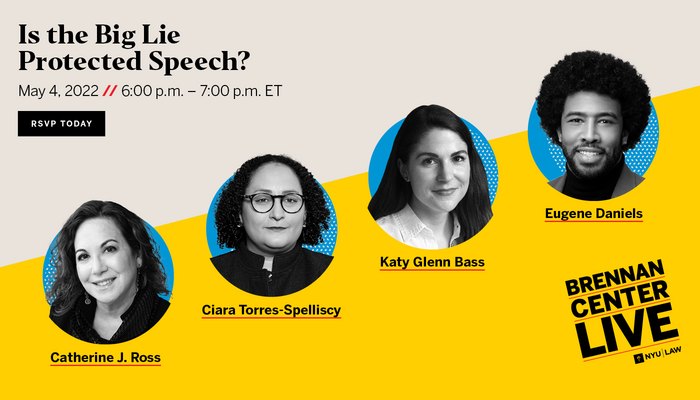More than a year after the 2020 presidential election, a Washington Post poll indicated that a full third of all Americans believed the false claim that Donald Trump won the 2020 election. And according to a recent NPR/Ipsos poll, two-thirds of Republicans believe the Big Lie claim that Joe Biden’s victory was only due to voter fraud. How can something this demonstrably false be allowed to spread unchecked?
The Supreme Court has ruled that certain lies and inaccuracies are protected under the First Amendment, mostly pertaining to political campaigns. But when an elected official’s lies intentionally undermine our democracy or result in an undue electoral benefit, does that protection extend? And since big lies need an audience, what is the responsibility of the press and private entities in preventing their spread?
Join us for a live discussion with Ciara Torres-Spelliscy, Brennan Center fellow and professor at Stetson Law; Catherine J. Ross, law professor at the George Washington University School of Law and author of A Right to Lie? Presidents, Other Liars, and the First Amendment; Katy Glenn Bass, research director at the Knight First Amendment Institute; and moderator Eugene Daniels, White House correspondent and Playbook co-author at POLITICO, to unpack just what the First Amendment does protect and whether the Big Lie is considered “protected speech.”
Speakers:
- Katy Glenn Bass, Research Director, Knight First Amendment Institute at Columbia University
- Catherine J. Ross, Lyle T. Alverson Professor of Law, George Washington University Law School
- Ciara Torres-Spelliscy, Fellow, Brennan Center for Justice; Professor of Law, Stetson University College of Law
- Moderator: Eugene Daniels, White House Correspondent and Playbook Co-Author, POLITICO
The Brennan Center for Justice at NYU School of Law provides reasonable accommodations to people with disabilities. Requests for accommodations for events and services should be submitted at least two weeks if possible before the date of the accommodation need. Please email adrienne.yee@nyu.edu or call 646–925–8728 for assistance.
